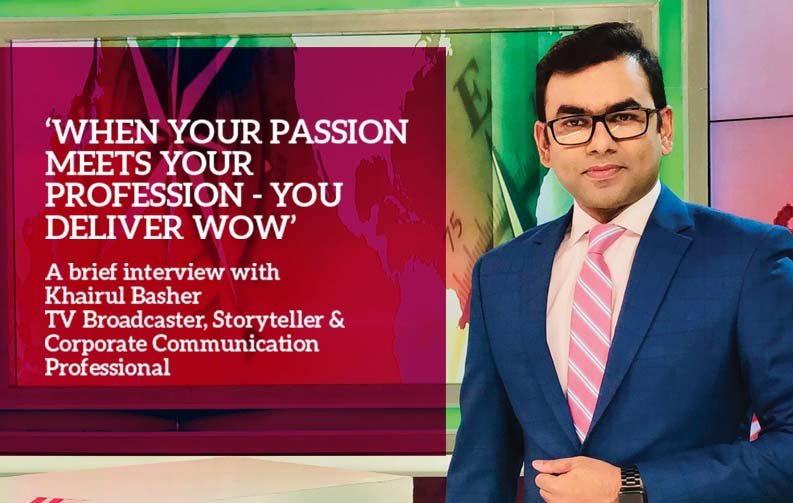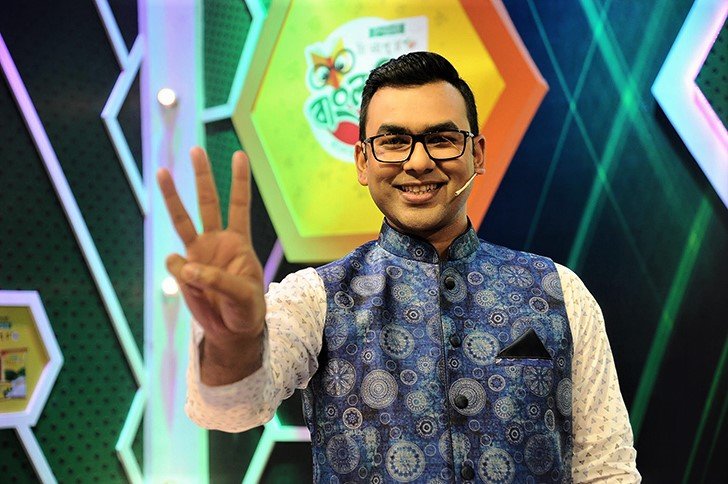A brief interview with Khairul Basher, TV Broadcaster, Storyteller & Corporate Communication Professional

Started his career back in 2000 in The Daily Prothom Alo as a feature writer and carried through his passion for news as a news and current affairs broadcaster in 2003 on Channel I, Khairul Basher is a professional storyteller on digital media. In this long journey, Basher singles out his contribution to three National Election result broadcast planning for Channel I on top of his regular role as a national news and current affairs expert.
Basher made his mark as a storyteller by promoting meritocracy among Bangladeshi youths through his popular TV reality show Ispahani Mirzapor Banglabid inspiring millions of Bangladeshi youth in learning in-depth Bangla. This Dhaka University graduate holds a University Deans Award for his extraordinary contributions in Debate and Public Speaking Nationally and Internationally, representing Bangladesh to FAO UN and winning Gold Medal in public speaking from H.E. Prime Minister Sheikh Hasina.
Currently, he is also working as a General Manager of Corporate Communications for the country’s leading telecom operator Grameenphone.
Khairul Basher, in his towering presence as a broadcaster, finds storytelling as a useful tool for advocacy dialogue, especially representing Grameenphone to different forums. Recently, Basher talks to Fintech team and shares his knowledge on the strategic plan, the impact of storytelling in the corporate communication segment. Here is the excerpt for Fintech readers.
Tell us a bit about yourself and your career story?
I started my career actually as a feature writer back in 2000 and later as a TV broadcaster. I got a job in news presentation on Channel I in 2003. I was then running my study in full swing besides news presentation. After my graduation, I joined Warid Telecom in 2006 and moved to Grameenphone in 2007. In this long career, I am blessed to play in the pitch of Marketing, Sales & Corporate Communications. My TV broadcaster-self is always with me since 2003.
You started your career at Channel in 2003 and then other work fields. You are a successful media anchor, news host, and a great corporate storyteller as well. How does a good storytelling lead to great communication?
The fundamentals of storytelling are all the same. You can play with the different approaches but not with the basics. A good storyteller crafts his story structure on the classic formula of antagonist and protagonist as a tool. When you pick up the role of a protagonist, probably you then become the central character who deals with a problem and a solution. On the contrary, you have the freedom to outline the avatar of an antagonist who pops up as an enemy – simply put your problem statement. Back in 2003, when I became a news personality, I had the opportunity for the first time to apply my skills of storytelling to a greater audience through national media, and I just used the classic storytelling formula to enthrall my audience. And this approach is still paying me off. At the end of the day, if you can’t tell it, you can’t sell it.
Some say communication is all about storytelling. According to you, what aspects of storytelling adhere to the function of impactful communication?
It depends on how you want to build your story. Please bear in mind, the soft side of your story is the sunny side of your story. So you should have the screwed set where you will be able to pick and pull the soft side of your story. In a smaller corporate setting for a business presentation or when we tell the story for a greater audience, we are always focused or driven to talk about the numbers and success. Yes, number matters but the human side or impact definitely carries more value than numbers. Our brain programmed to pay more attention to simple storytelling than complex numbers. So, naturally, when you talk about the soft side of your story, it becomes the story of everyone. That story actually then belongs to all. However, people can easily connect to your points and takes ownership. The word ‘mine’ or ‘own’ comes to this fact to adhere to make the communications impactful.
Your foundation has been built under the umbrella of corporate communication and media communication. How do these two vary in terms of doing communication and storytelling?
I was talking about the fundamentals of storytelling a few minutes ago. Corporate Communication and storytelling do not actually vary much, it is kind of the same. Say, for example, what I do for media, I tell the news to the audience of different social segments and make them understand. My neutral storytelling approach helps me earn trust. But I change my storytelling and presentation to a different mode for the youth audience of Banglabid – here I put my effort to influence and excite them. Two different approaches for two different objectives; one size doesn’t fit all, right? The same principle applies to corporate storytelling. Control over your narrative and method are two critical factors for making someone’s heart sing and get the buy-in. But you can use multimodal approaches in media where your narrative gets extensive support from different other tools such as music, acting or even digital augmentation but this scope is a little bit narrow in a corporate setting. Also, keep in mind as a storyteller your role is to find answers around why, who and how.

How does technology play an important part in devising the stories in modern-day corporate strategy?
See, things are changing or evolving or transforming every day. It is incredibly critical for us to pick up the right mode and medium. In a particular case, the evolution of Digital Media is gradually replacing all the traditional ones. The web media is evolving; naturally, traditional TV media is also coming to us through digital format, and we also tend to spend more time on digital media these days. Everything is basically now encompassing through digital media, so we don’t have a choice than upskilling ourselves and learn the new digital language and behaviors. These days, audience attention span is a lot thinner than before, so naturally, successful storytelling is becoming shorter and shorter. I want to mention from Richard Branson – if something can’t be explained on the back of an envelope, it’s rubbish!
People want to take all the information within a very short time. So, the cleverest and shortest classic of Ernest Hemingway, “For sale: Baby shoes, never worn” is the reality of this digital era. Short, intriguing, and effective. This classic masterpiece has become so relevant for digital media.
How do you manage significantly different roles every day?
Well, managing so many things are not that much easier. But when your passion becomes your profession, then you can handle more pressure than a regular day to day job. Over the years, I have built my persona as a storyteller and chose different paths to make the most of this skillset. However, setting priority is also very important. So sometimes I take a conscious call to let things go, and this is ok to me. We all do play different roles, and I am sure we have our unique formula to deal with this. Being a broadcaster, corporate, and a family guy, strict discipline help me get things to move along. And at the end of the day, If you are obsessive about your passion professionally, you will not deviate from your responsibility and quality.
Over the years, you have worked directly with the youth in various projects. What advice do you have for the youth and how do you want them to become good storytellers?
Yes, I have been working for different youth projects for a long namely iGen, Telenor Youth Forum, Banglabid. To me, they are the ones behind the silent revolution in this growing economy. They are the ones behind progressive Bangladesh in the making. I see the spark in them and a hunger for transcending further. I am exposed to the youths all over Bangladesh, and I see how they are taking the benefit of the Internet to overcome the digital divide and contribute more to the growth story of Bangladesh. Also, my TV show Banglabid unwraps a new youth segment that loves Bangla, knows this country better than so many of us. This is super exciting. I call them hope.
They are active; they are assertive and passionate about creative work. If they keep their focus tight with a little bit of patience, I think they will achieve amazing!
Thank you very much for your time to Fintech.
You’re welcome, and it is also my great pleasure to have chitchat with you.








